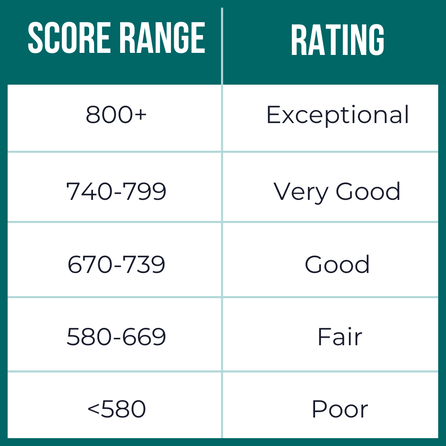your credit score can affect your car loan.
HOW YOUR CREDIT SCORE AFFECTS THE WAY YOU PAY.
Your Credit Score plays a major role when applying for a loan. Your score can determine what rate you are eligible for and ultimately the total cost of the loan. In general, if you have an "Exceptional" credit score, you will receive the lowest rate but if you have a lower credit score, you may only qualify for loans with higher rates.
YOUR SCORE.
Lenders pull your credit score to determine your rate. Your score is calculated from your history of debt and repayment. For more details on your credit, visit our "What is Credit" page! The best-known and most widely used scoring model is the FICO Score.
Your Credit Score plays a major role when applying for a loan. Your score can determine what rate you are eligible for and ultimately the total cost of the loan. In general, if you have an "Exceptional" credit score, you will receive the lowest rate but if you have a lower credit score, you may only qualify for loans with higher rates.
YOUR SCORE.
Lenders pull your credit score to determine your rate. Your score is calculated from your history of debt and repayment. For more details on your credit, visit our "What is Credit" page! The best-known and most widely used scoring model is the FICO Score.
fico scoring model
HIGHER CREDIT SCORE = LOWER LOAN RATE
LOWER CREDIT SCORE = HIGHER LOAN RATE
LOWER CREDIT SCORE = HIGHER LOAN RATE
Your credit score is not the ONLY factor. Other factors include:
PREPPING FOR PURCHASE
Do you want to improve your score prior to purchasing a vehicle?
1. Review Your Report: Start by knowing where your score is and review your credit report. You can order a free copy of your credit report here! Check for mistakes and dispute any that you find. Make sure to do this 3 to 6 months prior to purchasing your car!
2. Cosigner: If you have concerns that your score doesn't qualify you for the rate you want, a cosigner could help. A cosigner is a trusted friend or family member who is willing to apply for a loan with you. Ideally, this individual would have very good to exceptional credit. A cosigner shares in the responsibility of the loan.
3. Bigger Down Payment: A larger down payment can help offset a poor credit score by lowering your monthly payment and in some instances can even lower your interest rate.
4. Beware of Credit Applications: While it's good to have a solid credit mix, avoid applying for other forms of credit within six months of applying for a car loan.
5. Don't Close that Card: Unless a card is compromised, charging high yearly fees, or you have another compelling reason, don't close a credit card account. Closing cards can reduce your overall credit limit and hurt your credit utilization.
- The total amount of your loan.
- A down payment.
- The length of the loan.
- The age of the vehicle.
PREPPING FOR PURCHASE
Do you want to improve your score prior to purchasing a vehicle?
1. Review Your Report: Start by knowing where your score is and review your credit report. You can order a free copy of your credit report here! Check for mistakes and dispute any that you find. Make sure to do this 3 to 6 months prior to purchasing your car!
2. Cosigner: If you have concerns that your score doesn't qualify you for the rate you want, a cosigner could help. A cosigner is a trusted friend or family member who is willing to apply for a loan with you. Ideally, this individual would have very good to exceptional credit. A cosigner shares in the responsibility of the loan.
3. Bigger Down Payment: A larger down payment can help offset a poor credit score by lowering your monthly payment and in some instances can even lower your interest rate.
4. Beware of Credit Applications: While it's good to have a solid credit mix, avoid applying for other forms of credit within six months of applying for a car loan.
5. Don't Close that Card: Unless a card is compromised, charging high yearly fees, or you have another compelling reason, don't close a credit card account. Closing cards can reduce your overall credit limit and hurt your credit utilization.



